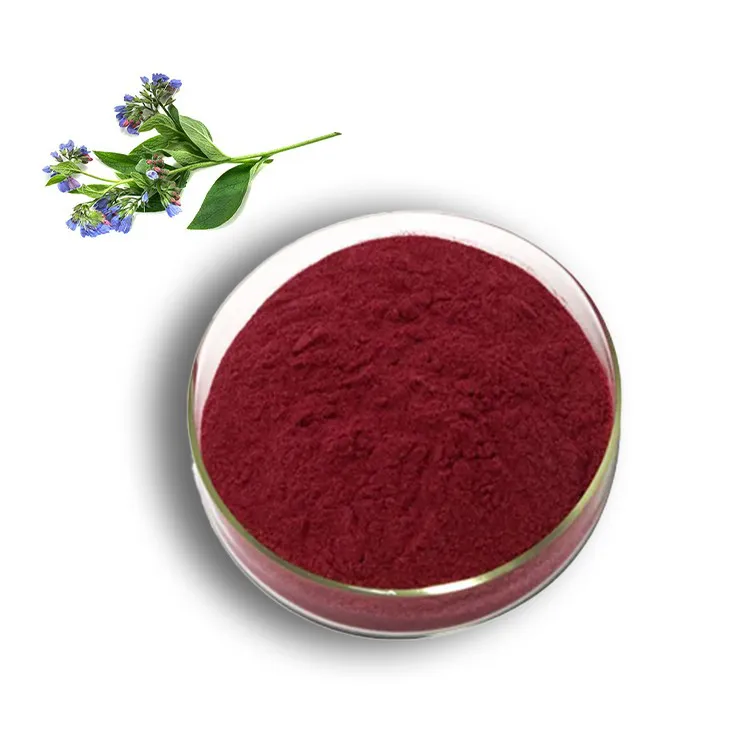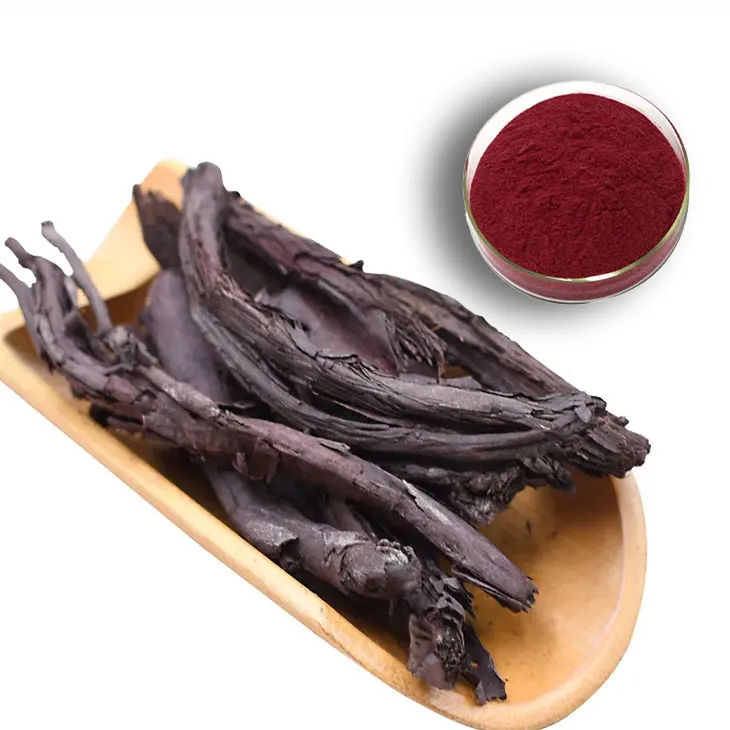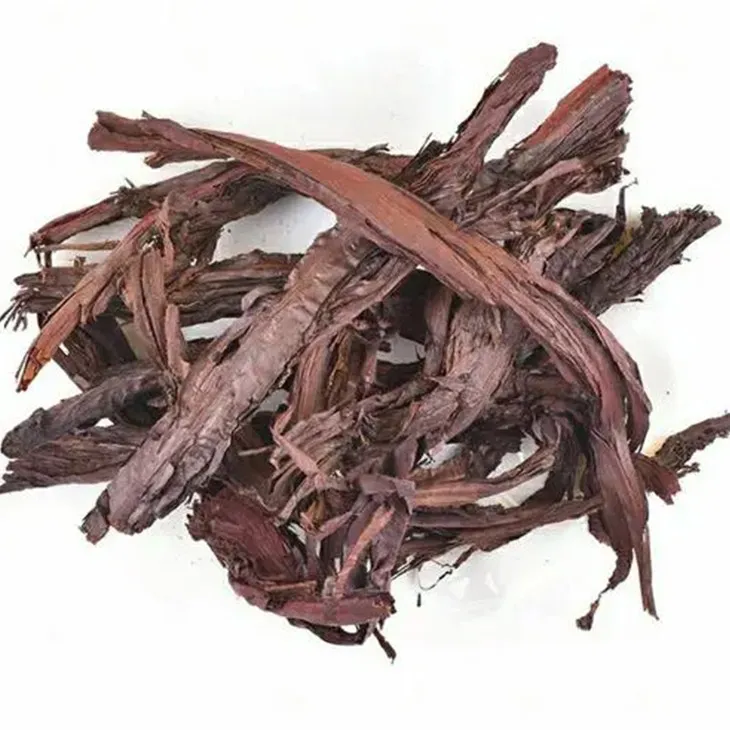- 0086-571-85302990
- sales@greenskybio.com
All the benefits of shikonin.
2024-11-12

1. Anti - allergic Benefits
Shikonin is a natural substance that has been found to possess significant anti - allergic properties. Allergic reactions occur when the immune system overreacts to harmless substances, known as allergens. In this process, certain immune cells get activated in an abnormal way. Shikonin can interfere with the activation of these immune cells involved in allergies, thereby modulating the allergic response.
Allergic rhinitis, commonly known as hay fever, is a widespread allergic condition. It is characterized by symptoms such as sneezing, itching, and a runny nose. Shikonin's ability to regulate the allergic response makes it a potential candidate for the treatment of allergic rhinitis. By targeting the underlying immune mechanisms, it may help to reduce the severity of symptoms and improve the quality of life for patients.
Atopic dermatitis is another allergic - related skin disorder. It often causes itchy, red, and inflamed skin. Research has shown that shikonin may also be beneficial in the treatment of atopic dermatitis. It can potentially reduce the inflammation and itching associated with this condition by modulating the immune response in the skin.

2. Cardiovascular Health Benefits
The heart is a vital organ, and maintaining its health is crucial for overall well - being. Shikonin may play an important role in protecting the heart. One of the major threats to heart health is oxidative stress. Oxidative stress occurs when there is an imbalance between the production of reactive oxygen species (ROS) and the body's antioxidant defenses. In the heart muscle, oxidative stress can lead to damage to cells and tissues, which may ultimately contribute to the development of cardiovascular diseases.
Shikonin has been shown to reduce oxidative stress in the heart muscle. It does this by scavenging ROS or by enhancing the body's antioxidant defense mechanisms. By reducing oxidative stress, shikonin can help to protect the heart muscle from damage and maintain its normal function.
Endothelial function is also closely related to cardiovascular health. The endothelium is a thin layer of cells that lines the blood vessels. A healthy endothelium is important for maintaining normal blood flow and blood pressure. Dysfunction of the endothelium is often an early sign of cardiovascular disease. Shikonin can improve endothelial function by promoting the release of nitric oxide, a molecule that helps to relax blood vessels and improve blood flow.
Heart attacks and strokes are two of the most serious cardiovascular diseases. By reducing oxidative stress and improving endothelial function, shikonin may potentially prevent the development of these diseases. It can also help to reduce the risk factors associated with heart attacks and strokes, such as high blood pressure, high cholesterol, and diabetes.

3. Potential in Neurodegenerative Diseases
Neurodegenerative diseases, such as Alzheimer's and Parkinson's, are a major health concern worldwide. These diseases are characterized by the progressive loss of neurons in the brain, which leads to cognitive and motor impairments. The exact causes of neurodegenerative diseases are still not fully understood, but inflammation and oxidative damage in the nervous system are thought to play important roles.
Shikonin has been studied for its potential in neurodegenerative diseases due to its anti - inflammatory and antioxidant properties. Inflammation in the nervous system can be triggered by various factors, such as infections, toxins, or autoimmune reactions. Chronic inflammation can lead to the activation of microglia, the immune cells in the brain, which can then release harmful substances that damage neurons.
Shikonin can reduce inflammation in the nervous system by inhibiting the activation of microglia. By doing so, it can prevent the release of harmful substances and protect neurons from damage. In addition, shikonin can also reduce oxidative damage in the nervous system. Oxidative damage occurs when ROS react with cellular components, such as lipids, proteins, and DNA, and cause them to malfunction. Shikonin can scavenge ROS and prevent oxidative damage to neurons.
For Alzheimer's disease, which is characterized by the accumulation of amyloid - beta plaques and tau tangles in the brain, shikonin may have the potential to slow down the progression of the disease. It can reduce the inflammation and oxidative damage associated with amyloid - beta plaques and tau tangles, and protect neurons from further damage. For Parkinson's disease, which is associated with the loss of dopaminergic neurons in the substantia nigra, shikonin may also be beneficial. It can reduce the inflammation and oxidative damage in the substantia nigra and help to preserve dopaminergic neurons.

4. Other Potential Benefits
Aside from the above - mentioned benefits, shikonin may also have other potential health benefits.
- Antibacterial properties: Some studies have suggested that shikonin may have antibacterial effects. It can potentially inhibit the growth of certain bacteria, which may be useful in the treatment of bacterial infections.
- Antifungal properties: Shikonin may also possess antifungal properties. It can inhibit the growth of fungi, which may be beneficial in the treatment of fungal infections, especially those that are resistant to conventional antifungal drugs.
- Wound healing: Shikonin may promote wound healing. It can stimulate the proliferation and migration of cells involved in the wound - healing process, such as fibroblasts and keratinocytes. It can also reduce inflammation at the wound site, which is important for proper wound healing.
5. Conclusion
In conclusion, shikonin is a natural substance with numerous potential benefits. Its anti - allergic, cardiovascular - protective, and neuroprotective properties make it a promising candidate for the treatment of various diseases. Additionally, its antibacterial, antifungal, and wound - healing properties further expand its potential applications in the field of medicine. However, more research is needed to fully understand the mechanisms of action of shikonin and to develop effective therapeutic strategies based on this natural substance.
FAQ:
What are the anti - allergic mechanisms of shikonin?
Shikonin can modulate the allergic response by interfering with the activation of immune cells involved in allergies, thus showing anti - allergic properties.
How does shikonin protect the heart in terms of cardiovascular health?
Shikonin may protect the heart by reducing oxidative stress in the heart muscle and improving endothelial function, which helps prevent the development of cardiovascular diseases such as heart attacks and strokes.
What is the significance of shikonin in neurodegenerative diseases?
Shikonin may have neuroprotective effects in neurodegenerative diseases like Alzheimer's and Parkinson's by reducing inflammation and oxidative damage in the nervous system.
Can shikonin be directly used to treat allergic rhinitis?
While shikonin shows potential in treating allergic diseases due to its anti - allergic properties, more research is needed to determine if it can be directly used to treat allergic rhinitis. Currently, it is mainly known for its ability to modulate the allergic response, but its direct application in treatment still requires further study.
Is shikonin more effective in preventing heart attacks or strokes?
At present, research shows that shikonin may play a role in preventing both heart attacks and strokes by protecting the heart through reducing oxidative stress and improving endothelial function. However, it is not clear which one it is more effective for as more in - depth research is required to make such a comparison.
Related literature
- The Anti - Inflammatory and Antioxidant Properties of Shikonin in Health and Disease"
- "Shikonin: A Promising Natural Compound for Cardiovascular Protection"
- "Neuroprotective Effects of Shikonin in Neurodegenerative Disorders"
- ▶ Hesperidin
- ▶ Citrus Bioflavonoids
- ▶ Plant Extract
- ▶ lycopene
- ▶ Diosmin
- ▶ Grape seed extract
- ▶ Sea buckthorn Juice Powder
- ▶ Fruit Juice Powder
- ▶ Hops Extract
- ▶ Artichoke Extract
- ▶ Mushroom extract
- ▶ Astaxanthin
- ▶ Green Tea Extract
- ▶ Curcumin
- ▶ Horse Chestnut Extract
- ▶ Other Product
- ▶ Boswellia Serrata Extract
- ▶ Resveratrol
- ▶ Marigold Extract
- ▶ Grape Leaf Extract
- ▶ New Product
- ▶ Aminolevulinic acid
- ▶ Cranberry Extract
- ▶ Red Yeast Rice
- ▶ Red Wine Extract
-
Tamarind extract powder
2024-11-12
-
Withania Somnifera Extract
2024-11-12
-
American Ginseng Root Extract
2024-11-12
-
Mangosteen extract powder
2024-11-12
-
Alisma Extract
2024-11-12
-
Cocoa Extract
2024-11-12
-
Polygonum Cuspidatum Extract
2024-11-12
-
Shikone Extract
2024-11-12
-
Red Wine Extract
2024-11-12
-
Red Vine Extract
2024-11-12





















